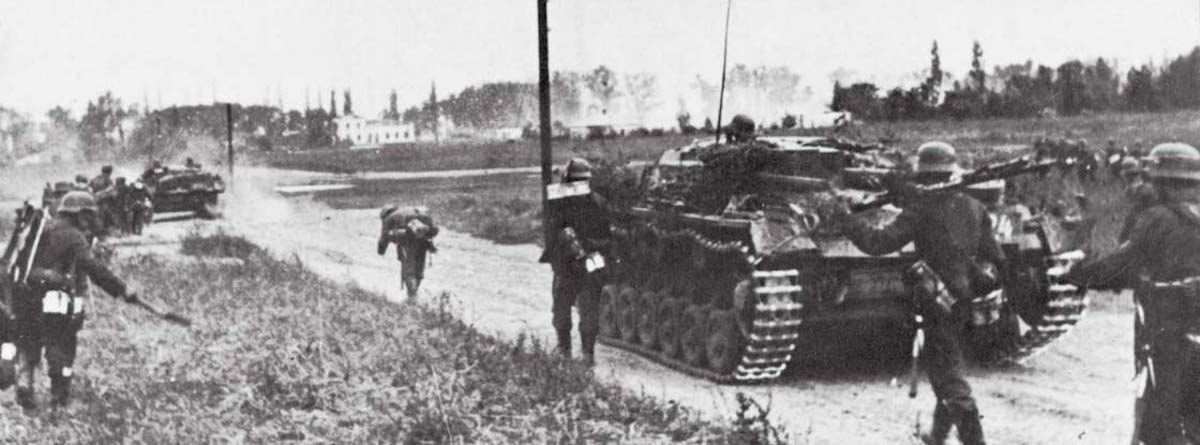On the Rise and Fall (and Rise?) of German Militarism, From the 17th Century to Today
Peter H. Wilson Recommends Felix Römer, Michael Howard, and More
The title of my new book, Iron and Blood derives from Bismarck’s famous remark in 1862 that hard power trumped parliamentary debates. He failed to convince his audience and was only rescued from the ensuing constitutional crisis by a succession of military victories which only appear inevitable with the benefit of hindsight. The episode encapsulates the book’s central argument that militarism has indeed been integral to the German past and has shaped how Germans have conducted wars, but that it was neither an end destination, nor a single trajectory of development.
Germans have not possessed a unique “genius for war,” nor can their military history be read entirely through Prussia’s experience. Today’s Germany was indeed partly forged through violence, but warfare was also significant in shaping Austria and Switzerland in often surprising ways, while the relative significance of conflict can only be gauged when military history is integrated with the wider story of these countries’ pasts.
The following books on the list range from the 1600s to today, and provide the reader with an insight into the diversity of the German experience of war, its conduct, societal impact, and human cost.
*

Hans Jacob Christoffel von Grimmelshausen, The Adventures of Simplicissimus
Grimmelshausen’s fictionalized account of how to survive the Thirty Years War was a bestseller when it first appeared in 1667, but gradually faded from memory until rediscovered in the 1790s by the German Romantics and celebrated as a gothic horror story. It is a rollicking account, partly based on Grimmelshausen’s own experiences, first as a civilian, and later a soldier caught up in the maelstrom of a conflict which seemingly escaped all rational control.
Somewhat like Voltaire’s Candide, the eponymous hero gradually matures as he is plunged from one fantastical adventure to the next in a novel teaming with real and fictitious characters. Grimmelshausen mixes in middlebrow learning, moral commentary, and the grumbling of an old campaigner, such as his depiction of the military hierarchy as a tree with corrupt officers at the top enjoying the fruit, and leaving little or nothing for their hardworking subordinates.
Much of it is genuinely funny, but also frequently deeply moving, not least the opening scene in which Simplicissimus recounts how a party of soldiers ransack his home farm, torturing and raping his family and servants. Written from a child’s perspective, this powerful passage was frequently cited by historians from the later nineteenth century onwards to convey the horror of a war which, even after 1945, most Germans believed to be their country’s greatest disaster. Grimmelshausen was the voice of the everyman until the discovery and publication in 1994 of the extraordinary diary of Peter Hagendorf, an ordinary soldier whose work has not yet been fully translated into English. Simplicissimus remains a rewarding read, nonetheless.
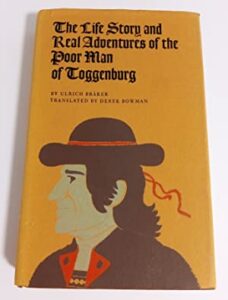
Ulrich Bräker, The Life Story and Real Adventures of the Poor Man of Toggenburg (translated by Derek Bowman)
Ulrich Bräker hailed from Toggenburg, one of the numerous small dependent territories in the pre-modern Swiss Confederation that was characterized by gross inequalities, despite the country’s reputation as a haven of peace and democracy. Like many Swiss, Bräker became a soldier for a foreign power, though he was more unusual in that he joined the Prussian army in 1755 rather than the more common choice of French, Dutch, Savoyard, or Papal service.
An autodidact, he published his memoirs in 1789 and was immediately celebrated as an authentic voice of the supposedly unspoiled “natural man” of an Alpine idyll. As so often turns out, his life story is both more complex and interesting. Much of his work is concerned with his early life, and his later marriage once he returned to Switzerland in 1756, all filtered through his pietist outlook and close reading of the Bible.
Though lasting little over a year, his Prussian military service forms a substantial part of his autobiography and is one of the few detailed accounts of what life was like in the army of Frederick the Great. Duped into thinking he was only joining as his recruiting officer’s service, Bräker soon found himself in one of Prussia’s major garrisons where he learned how to survive on a soldier’s miserable wages. Mobilized at the start of the Seven Years War, he took the opportunity of the opening battle of Lobositz to desert, and eventually made his way home. Derek Bowman’s translation is the best of several English versions in capturing the original, often earthy style, and the story moves along at a cracking pace.
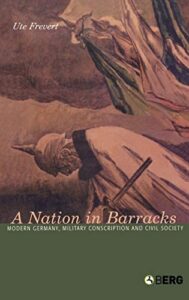
Ute Frevert, A Nation in Barracks: Modern Germany, Military Conscription and Civil Society
Prior to the early nineteenth century, most soldiers lived among civilians, unless on campaign or called to the colors for annual training. After the 1670s, they had to sign up for several years at a stretch or were drafted to serve for as long as their ruler required. The introduction of new forms of conscription during the Napoleonic era transformed military-civil relations, most notably through Prussia’s short service model, adopted in 1814 and copied throughout the German states and Austria by the 1860s. Military service became a cohort experience, as young men were inducted together, housed separately in barracks, before returning to civilian life after two or three years, with often only nominal refresher training associated with reserve formations.
Frevert’s highly readable book charts this fundamental change which forged new connections between the armed forces and civil society. A key theme throughout is that many men escaped military service altogether, despite the formal universal obligation. Prior to the 1860s, the rich could often pay a substitute, but many were simply not recruited because governments could not afford to train them all.
She is especially good in discussing the numerous social inequalities characterizing service during the nineteenth century, notably in Prussia which offered wealthy, educated recruits the chance to join as a One Year Volunteer, provided they paid for their own uniforms. Many intellectuals, like Max Weber and Friedrich Meinecke, chose this option. Jewish volunteers, like the future industrialist and politician, Walther Rathenau, also preferred this, though they frequently faced considerable prejudice which frustrated their efforts to secure the coveted status of Reserve Officer after their initial period of service.
Service only came close to the theoretical universality during the two twentieth-century world wars. Germany mobilized 13.2 million men in the first of these, equivalent to 81 per cent of its pre-war adult male population. Around 20 million served during the Second World War which also saw substantial numbers of women mobilized for anti-aircraft batteries and numerous second echelon roles. Only East Germany approached these levels after 1945, though conscription remained a feature of many men’s lives in the west until its suspension by reunified Germany in 2011.

Michael Howard, The Franco-Prussian War
Campaign history has fallen somewhat out of fashion and is widely (if often unfairly) perceived as a “drums and trumpets” approach to the study of war. Michael Howard’s acclaimed account of the war of 1870-1 remains an example of how to do it well, even though it first appeared over sixty years ago.
The book makes no pretense of covering all issues with, for example, the causes and consequences covered only briefly, while the cultural dimensions disappear almost completely, as they do in much of the other scholarship of that era. Nonetheless, Howard was convinced that “military forces are shaped, not only by the weapons with which they are armed, but by the social backgrounds from which they emerge and the political function for which they are intended.” This broader context informs the entire book, as well as defining Howard’s approach to War Studies, an interdisciplinary line of enquiry which he did much to establish.
The conflict was central in establishing the belief that the German high command had a special “genius for war,” thanks to its spectacular initial victories over France’s regular army which, until then, had been considered the best in Europe. There are more recent accounts which correct Howard on some points, not least retitling the conflict as the Franco-German War to take more account of the contribution of Bavaria and the other (then still independent) southern states alongside Prussia. However, none can match the fluidity of his narrative or the balance in his assessments.
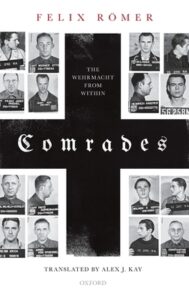
Felix Römer, Comrades: The Wehrmacht From Within
This book gave me nightmares. It is based on an extraordinary set of sources compiled by British and American intelligence. Based on experience from the First World War, British officers began to collect information systematically from German prisoners of war using interrogations, questionnaires, wiretaps of inmates’ cells, and “stool pigeons” recruited from the captives. A group of officers, including Royal Navy Commander Ian Fleming, took these techniques to the United States after its entry into the war in 1941. The result is over a quarter of a million pages of transcripts of conversations between prisoners who had been specially selected as possessing potentially useful information and sent to a secret camp concealed from the Red Cross.
Römer uses this material to understand what motivated Germans to fight a genocidal war. This question has been addressed by many other books and remains hotly contested in Germany today. Römer’s account is distinguished by his careful handling of the material and avoidance of monocausal explanations. He recognizes that the prisoners inhabited several mental worlds simultaneously, while they were not always reliable narrators when bragging to their comrades, or concealing matters which might have reflected badly on themselves. One man’s war was not necessarily the same as another’s and there were considerable differences between branch of service, location or deployment, and the time of capture.
He concludes that soldierly ethos trumped Nazi ideology in persuading men to fight despite increasingly difficult circumstances. The quality of junior officers and squad leaders was also crucial to the small unit cohesion that Allies came to admire and sought to replicate in their own armies after 1945. Though most soldiers had a poor grasp of Nazism, core elements of that ideology were deeply rooted in other beliefs they did share and encouraged the shocking violence many of them engaged in. An enlightening but also deeply disturbing book.
__________________________________
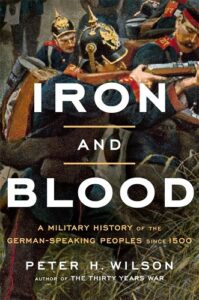
Iron and Blood: A Military History of the German-Speaking Peoples Since 1500 by Peter H. Wilson is available from Harvard University Press.

